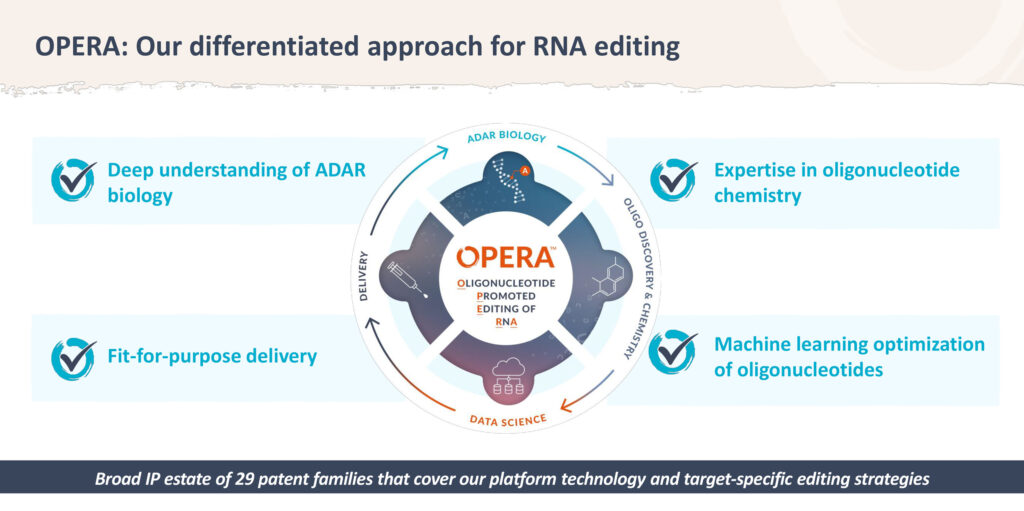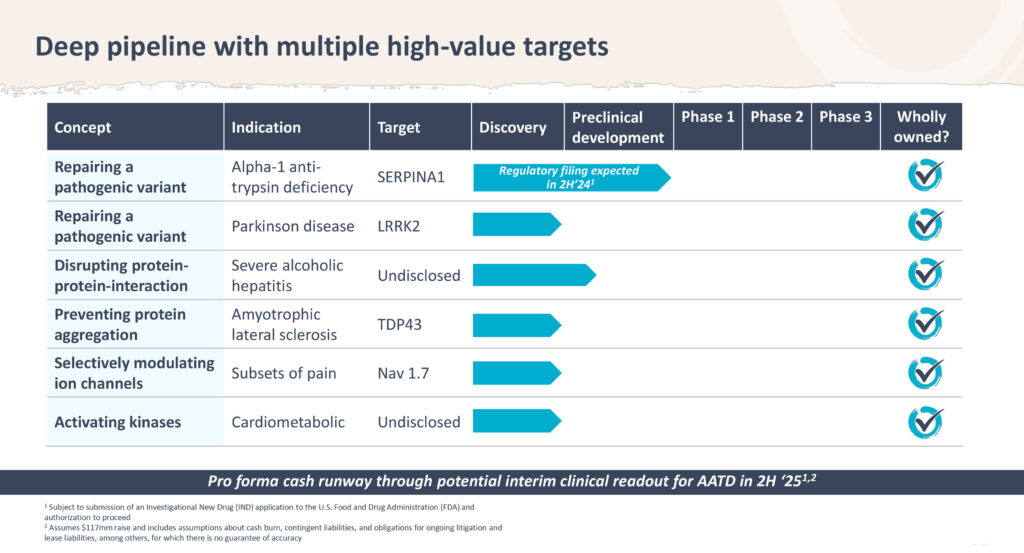
Korro Bio’s reverse merger with Frequency Therapeutics (NASDAQ:FREQ), which is expected to close in the 2023 fourth quarter, and concurrent financing are expected to build up an investor base to bankroll Korro’s proprietary platform, OPERA, for RNA editing with the potential to functionally repair genetic mutations transiently, as well as create de novo mutations to alleviate clinical pathology.
“Through OPERA, we can generate a unique, engineered oligonucleotide capable of introducing precise edits in a specific RNA sequence through a single base change,” Ram Aiyar, Ph.D., president and CEO of closely-held Korro, says in an interview with BioTuesdays.
“By precisely and transiently editing the genetic mutation in RNA rather than permanently altering DNA, we believe OPERA can avoid the potentially harmful effects of permanent DNA-based genome editing, such as off-target edits,” he adds.
Dr. Aiyar says Korro’s differentiated approach for RNA editing stems from a deep understanding of the biology and chemistry and expertise in oligonucleotide AI optimization along with a fit-for-purpose delivery system.

For patients, he predicts that Korro-created treatments have the potential to deliver the benefits of gene therapy beyond rare genetic diseases into more common diseases affecting larger patient populations.
“We decided the best way to support proof-of-concept in humans in our lead indication in addition to further expanding our pipeline was to raise capital in conjunction with a public listing,” Dr. Aiyar points out. “Our preclinical work has removed multiple layers of risk.”
Korro was established in 2018 to commercialize the work of Josh Rosenthal, Ph.D., a neurobiologist at the Marine Biological Laboratory, whose research led him to focus on editing RNA transcripts in a cell, potentially altering the proteins produced by that cell.
Dr. Rosenthal, who remains an advisor to Korro, is one of four co-founders of Korro, all of whom were also involved in founding one of the first DNA-mediated CRISPR-Cas 9 companies. Dr. Aiyar joined Korro in 2020.
The transaction with Frequency Therapeutics is expected to extend Korro’s cash runway through several milestones and into 2026, such as an interim clinical readout in the second half of 2025 for its lead program, the treatment of alpha-1 anti-trypsin deficiency (AATD). AATD is a genetic disorder characterized by a lack of the protein, alpha-1 antitrypsin (A1AT), that impacts the lungs and liver.
The combined company, to be known as Korro Bio, is expected to have cash of approximately $170-million at closing, including $117-million from the planned concurrent financing. Dr. Aiyar says Korro had raised approximately $225-million, prior to the merger, to support development of its OPERA platform.
According to Korro, it has demonstrated proof of concept in preclinical models with data showing an increase of normal A1AT protein to 85% of total protein in circulation. Studies in mice and non-human primates have demonstrated high editing efficiency and expression of functional A1AT protein.
Later this year, Korro plans to nominate a development candidate for this program. “Our AATD development candidate will be designed to repair inherited mutations and restore production of a normal functional liver protein, by harnessing the body’s ADAR natural base editing system.”
The ADAR gene provides instructions for making RNA-specific adenosine deaminase 1 (ADAR1), a protein involved in making changes to RNA. Specifically, it attaches to RNA and changes an RNA nucleotide, adenosine, to another nucleotide called inosine.
The signs and symptoms of AATD and the age at which they appear vary in individuals. There are currently an estimated 100,000 patients in the U.S. with a PiZZ, or homozygous, genotype.
People with AATD usually develop initial symptoms of lung disease between ages 25 and 50. The earliest symptoms are shortness of breath following mild activity, reduced ability to exercise, and wheezing.
Affected individuals often develop emphysema, which is a lung disease caused by damage to the small air sacs in the lungs and includes difficulty breathing, a hacking cough, and a barrel-shaped chest.
Korro’s RNA editing approach has created a broad pipeline with immense potential. “Our RNA editing approach also has the potential to repair pathogenic variants in Parkinson’s disease; disrupt protein-protein interactions in severe alcohol hepatitis and ALS; and selectively modulate ion channels in subsets of pain, Dr. Aiyar says.

• • • • •
To connect with Korro Bio or any other companies featured on BioTuesdays, send us an email at editor@biotuesdays.com.







